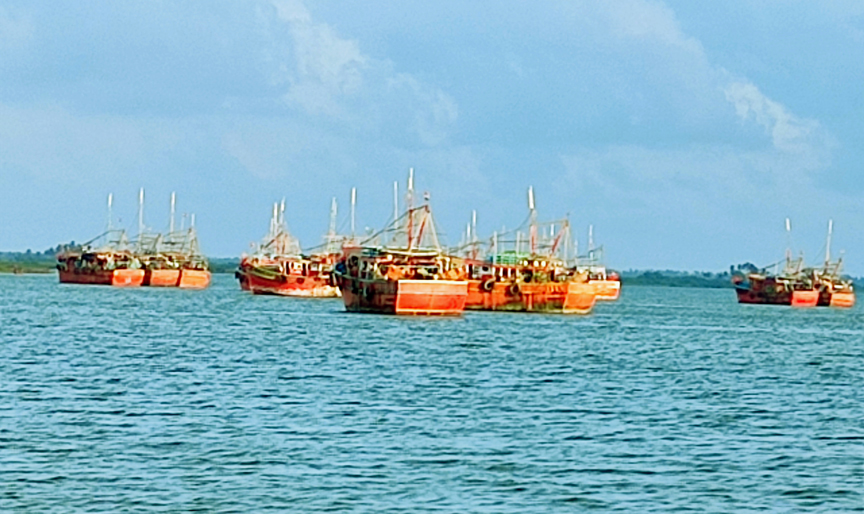Chennai: The diplomatic relationship between India and Sri Lanka, the two neighbouring countries with several shared cultural ethos and beliefs and economic, social, cultural and business ties is now becoming tense after India complained about its fishermen being attacked by Sri Lankan security forces. The recent concern is the arrest and subsequent judicial remand of 68 Indian fishermen by the Sri Lankan navy.
The Indian fishermen from Tamil Nadu’s Pudukottai, Mandapam and Rameswaram were arrested by the Sri Lankan navy for allegedly crossing the International Maritime Border Line and fishing in Sri Lankan waters. However, the Indian fishermen association office-bearers have denied the allegation and said that they had fished in Indian waters in the Palk Straits.
The arrest of fishermen in three batches of 6, 7 and 55 was made in the second week of December 2021 by the Sri Lankan navy alleging that they had transgressed into Sri Lankan waters. The arrested fishermen were remanded to judicial custody. Calls from the Tamil Nadu political leadership for the Indian government to intervene in the matter diplomatically were accepted and the Indian external affairs ministry entered into diplomatic parleys with the Sri Lankan side. The fishermen association leaders were also invited to air their views at the meeting called by the Ministry of External Affairs virtually.
Advocate Antony Jesraj, leader of the Tamil Nadu fish workers association, an umbrella body of fishermen from Tamil Nadu, told IANS that “The MEA had taken up seriously the matter raised by people of Tamil Nadu cutting across political lines regarding the immediate release of Indian fishermen who went to the sea for fishing from Pudukottai, Mandapam and Rameswaram.”
Subsequently, on January 5 a Sri Lankan court in Mannar released 13 fishermen. The Consulate General of India in the island nation met the fishermen and made efforts to relocate them back to their families in India.
However, as a major reversal to the Indian efforts, a Sri Lankan court in Jaffna extended the judicial custody of the remaining 55 Indian fishermen on January 12 and this has turned into a major concern for the Indian side.
This has led to a major furore in Tamil Nadu with political parties and fishermen associations cutting across political divisions calling upon the government to take up the matter seriously with Sri Lanka. Tamil Nadu Chief Minister M.K. Stalin in a tweet on Thursday called upon the Centre to immediately intervene and seek the release of the beleaguered fishermen.
Stalin in the tweet said, “Deeply disappointed to note that the remand of our fishermen had been extended. Urge Hon’ble Dr. S. Jaishankar to prevail upon Sri Lanka to secure their immediate release.”
Both Indian and Sri Lankan fishermen have been fishing in the Palk Bay Straits for several years but the maritime agreements signed between the two sides in 1974 and 1976 led to the demarcation of the International Maritime Boundary Line (IMBL). The two treaties between the two countries led to the Palk Bay Strait connecting India and Sri Lanka being declared a “two-nation pond” under the United Nations Convention on the Law of the Sea rules.
This led to the ban on fishing in international waters of the two countries. After the end of the civil war between the LTTE and the Sri Lankan government in 2009, there has been a demand for a total ban on the Indian fishermen from Tamil Nadu fishing inside Sri Lanka and to arrest those who were fishing in Lankan waters as also to confiscate their boats.
In 2021 more than 221 Indian fishermen, mostly from Tamil Nadu, were arrested by the Sri Lankan navy. The forces of the island nation had resorted to stone pelting and the Indian fishermen had complained that they were being fired upon by the Sri Lankan navy. Five Indian fishermen lost their lives in 2021 and the most recent victim was R. Rajkiran, a fisherman from Kottaipattanam in Pudukottai, Tamil Nadu whose vessel was hit by a Sri Lankan naval vessel on October 20, 2021, leading to his death. There were widespread protests in Kottaipattanam with fishermen setting up roadblocks to ensure justice to the deceased Rajkiran.
The year 2021 also saw more than 100 fishing boats of Tamil fishermen being seized by the Sri Lankan navy. The fishermen say that this would lead to huge financial losses to them as there was no possibility of replacing a vessel as almost all of these boats were bought through loans with a fishing boat costing as much as Rs 60 lakhs.
Other than crossing the IMBL, the major grouse of the Sri Lankan navy was that Indian fishermen were fishing using trawlers which were banned in the island nation.
Marine biologist and an expert in fishing and deep-sea fishing issues, Dr Manonmani. G who heads the Marine Study Research Group based at Kanniyakumari, told IANS that “First and foremost India must use strong diplomatic measures and demand in no uncertain terms the release of our fishermen immediately. Secondly, Indian fishermen must not use the trawlers that are banned in Sri Lankan waters and implement the Blue Resolution leading to modern deep-sea fishing that does not affect the marine wealth of Sri Lankan waters.”
She said that a Palk Bay Authority (PBA) should be formed with all the stakeholders including marine biologists, fishing experts, government representatives, and other experts.
Marine experts said that if the PBA is constituted and the issue of fishing is ironed out with the Indian side accepting the demands of the Sri Lankan navy and other concerned authorities, Sri Lanka should not resort to shooting and stone pelting at Indian fishermen even if they cross the IMBL.
IANS
